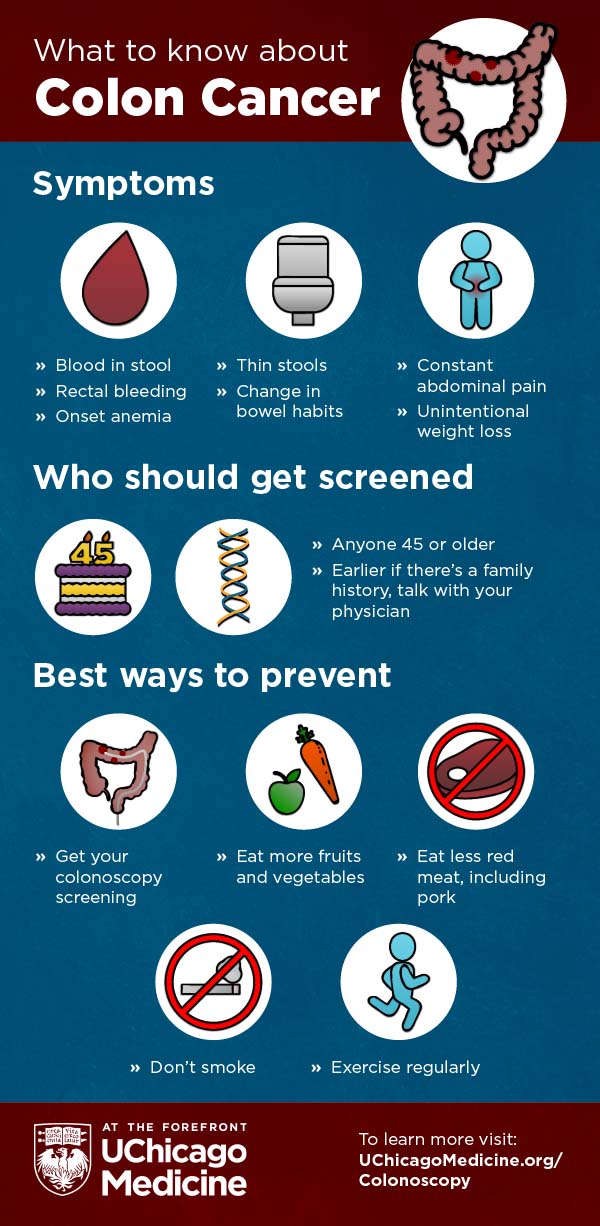New guidelines lower colorectal screening age from 50 to 45

Adults who are at average risk for colorectal cancer used to start having regular colonoscopies when they turned 50. Now the timeline has changed. colorectal cancer cases are on the rise among young and middle-age people. Deaths of people under age 55 increased 1% per year from 2008 to 2019, even though overall colorectal cancer rates have dropped.
Colorectal cancer is most treatable when found early. Colonoscopies not only detect the disease, but prevent cancer because precancerous polyps can be removed during the procedure.
In May 2021, the U.S. Preventive Services Task Force issued new recommendations for colorectal cancer stating that people at average risk should start screening at age 45, which will allow health insurance companies to cover the cost of the test at a younger age.

How and when should a person get screened for this potentially deadly disease? Here are some specific recommendations:
- Starting at age 45, individuals with an average risk of colorectal cancer should undergo regular screening with one of six different tests, depending on patient preference and test availability. These tests include a FIT (fecal immunochemical test) or gFOBT (guaiac-based fecal occult blood test) every year, stool DNA test every three years, a CT colonography or flexible sigmoidoscopy every five years, or colonoscopy every 10 years. The recommendations do not prioritize any one test over another.
- Following a positive result from a non-colonoscopy screening test, a timely follow-up colonoscopy must be performed to prevent cancer.
- Average-risk adults in good health should continue colorectal cancer screening through age 75.
- For patients between 76 and 85, screening decisions should be made jointly with clinicians based on patient preferences, life expectancy, health status, and prior screening history.
- Individuals over age 85 should be discouraged from continuing screening.
- People with a higher risk of colorectal cancer, such as a family history, should ask their physician to determine the best age to start screening.
Colorectal cancer is expected to cause about 52,550 deaths in 2023, according to the American Cancer Society.
The University of Chicago Medicine is working to lower that number through a number of initiatives. The Illinois Colon CARES web portal is used by Chicago area clinics and hospitals to help vulnerable underserved populations have access to colonoscopies. Staff members from federally qualified health centers help people schedule colonoscopies while they’re at the doctor’s office, rather than asking them to call a number when they get home, closing the gap in scheduling and communication.
Colonoscopies not only detect the disease, but prevent cancer because precancerous polyps can be removed during the procedure.
UChicago Medicine gastroenterologist Karen Kim, MD and her team initiated this push in 2015 after receiving a five-year, $4.5 million grant from the Centers for Disease Control and Prevention. The grant was given to the Center for Asian Health Equity – a collaboration between UChicago Medicine and the Asian Health Coalition. It marked the first time an organization in Illinois ever received CDC funding for colorectal cancer screening and prevention.
The grant was used to launch Cook County CARES (Colon Cancer Alliance to Reignite and Enhance Screening), which improved screening rates up to 30% among low-income Asian American, Hispanic and African American residents in Cook County. African Americans, in particular, are disproportionately affected by colorectal cancer.
After another round of federal funding, a $4.25 million grant in 2020, the program evolved into Illinois Colon CARES.
“Not only do we need to ensure our screening recommendations evolve along with our scientific knowledge, but we also need to ensure those individuals who need screening are getting it,” Kim said.
Which colorectal cancer test is right for you?
Our shared decision-making guide (PDF) can help you work with your healthcare team to decide on the best colorectal cancer test for you.
Download our colorectal screening options guide
Colorectal Cancer Care
At UChicago Medicine, colorectal cancer care is delivered by a team of experts, including specialists in medical oncology, gastroenterology, colorectal surgery, radiation oncology, genetic counseling and more. Our patients receive holistic care that balances advanced, effective treatment with the goals of preserving bowel function and quality of life.
Learn About Our Colorectal Cancer Care